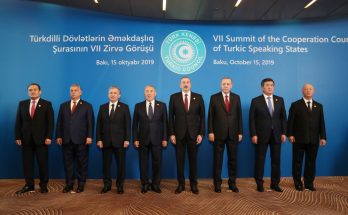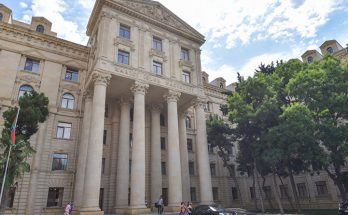
The United Nations High Commissioner for Human Rights Zeid Ra’ad Al Hussein warned the EU on Thursday against collective and arbitrary expulsions of migrants, APA reports quoting Anadolu agency.
Speaking to the UN Human Rights Council about his annual report on human rights, he said, “The EU’s draft arrangement with Turkey earlier this week raises a number of very serious concerns. We do not yet have full details of this draft.”
“I plan to discuss my concerns in full during my visit to Brussels early next week, before the two-day EU Summit which begins on 17 March. Among my concerns is the potential for collective and arbitrary expulsions, which are illegal,” he added.
“I must also reiterate my profound concern about restrictive measures such as erecting fences, denying people access to individualized procedures, and arbitrarily denying entry to people of specific nationalities,” he said.
Calling the situation in Greece dramatic, he said migrants are now unable to leave Greece due to border restrictions imposed by Austria, Slovenia, Croatia, Serbia, and Macedonia.
“I urge the EU to adopt a much more rights-compliant and humane set of measures on migration at next week’s summit,” he said.
– Russia
About the Russian government’s intention to close the UNHCR Moscow office, he said, “I am concerned about signals received from the government regarding its intention to close our presence in Moscow.”
“In Ukraine, our teams monitor possible gaps with respect to human rights and humanitarian law, particularly in areas of the east controlled by armed groups, and in Crimea,” he said.
– Syria
About the Syria crisis, he said, “I am deeply concerned about the immense suffering of the people of Syria. The impact of the conflict on this and succeeding generations of Syrians will be immeasurable.
“I also urge them to implement the cessation of hostilities agreement, which will allow humanitarian assistance to reach people in need and open the path to a political solution.”
– Palestine-Israel
“Over the past five decades, people in Palestine have endured not only occupation, but also multiple, overlapping human rights violations,” he said.
“The frustration and despair of Palestinians arises from the prolonged occupation, ongoing settlement expansion and settler violence, the blockade of Gaza, and failure to ensure accountability. With the young, indeed children, at the forefront of this escalation, alarm bells should be ringing for all of us. Decision-makers must understand that new generations of Palestinians are losing hope,” he added.
“I urge this council to reaffirm its support for a just, fair, and peaceful resolution to the Israeli-Palestinian conflict – one that involves an independent Palestinian state, and an Israel that is safe and secure in its borders,” he said.
– Turkey
Indicating that Turkey faces challenges in countering terrorism, he said, “I remain extremely concerned at the deterioration of the human rights situation in the southeast of Turkey. Escalating clashes have led to hundreds of deaths, and significant displacement.”
“I fully recognize the challenges Turkey has been facing while countering terrorism, including in the context of spillover effects of the Syrian crisis. However, it is essential that human rights are respected at all times while undertaking security or counterterrorism operations.
“Last weekend’s action by the Turkish authorities against the daily Zaman newspaper is the latest in a series of very worrying developments regarding media.”
Speaking to the council, Mehmet Ferden Carikci, Turkey’s ambassador to the United Nations office in Geneva, said, “In Turkey, no journalist has been detained or convicted on the grounds of his or her writings, publications, expressions, or thoughts.”
“Turkey’s counterterrorism efforts are conducted in compliance with legal obligations. Contrary to the baseless propaganda relayed by the terrorist organization PKK, utmost vigilance is displayed by security forces to protect civilians,” he added.
“All terrorist organizations targeting Turkey will be responded to with equal determination, as we have every right to under international law,” said Carikci.
“On the migrant/refugee crises, it is obvious that taking solely ‘security measures’ is not the right approach to address the challenge. A far more comprehensive and human rights-based approach would ensure that migrants are human beings with rights,” he added.
– Yemen
Zeid said, “Any peace process must be grounded in respect for human rights, which provide the only possible foundation for building a sustainable future for the country. These recommendations are also vitally relevant to the conflict in Yemen, which continues to take a terrible toll, with more than 3,000 civilians killed, and 5,700 wounded, since it began a year ago.
– U.S.
“I am also concerned by issues related to police violence in the U.S.A., where some 300 African Americans were reportedly killed by the police in 2015. More action is needed in all countries where such cases are alleged, including measures to hold perpetrators accountable, and to provide remedy for the victims,” he said.
“Over the past 14 years, the Guantanamo Bay Detention Center has become, in the global public mind, a synonym for abuse and denial of due process guarantees. I trust that President Obama’s new plan to close it will at last be implemented, and that the shocking practice of indefinite detention without charge or trial will be brought to an end,” he added.
“The serious human rights violations which were revealed over a year ago by the Senate Report cannot, under international law, remain unpunished. The government should ensure that there is accountability for all those who were complicit or participated in torture, and should take steps to ensure remedy for the victims,” said Zeid.
Apa.az




